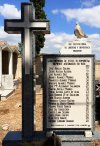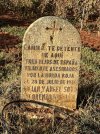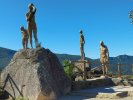Pilgrims on the del Norte may wish to take note of the Moorish cemetery on the way into Barcia (on the lefthand side), the resting place of the dead of the Nationalist Moorish Legion. IIRC many were from the Battle of Oviedo. The cemetery is not maintained, and about 500 soldiers were buried there. There is a 12-minute documentary on Youtube for those who are interested (
). While the wikipedia entry can be read in English, I do not think I have seen anything in English on it although Lord Thomas' book on the Civil War has some general information on the Moorish Legion.
A postscript; over the years and many Caminos, I have from time to time been privileged with discussions of the effect of the War on Spanish pilgrims. We are all experienced with long-bus-ride-syndrome, when one’s hitherto-unknown seatmate spills long-silenced narratives. A businessman walking into Villafranca de Bierzo telling me of how, when he was twelve years old and in his ancestral pueblo for the annual patron saint’s fiesta, his father walked him to a grove outside the town and said, that nobody speaks of this but that he must know and remember, when the Nationalists came into the pueblo they brought the council, teacher, and nurse to that spot– and that they were still there. A waiter in Melide, when custom was quiet and the orujo was on the table, told me of how his grandmother was a child when the father of a friend disappeared. And at the casino in Huesca, I was a surprise guest (in remoter areas, pilgrims at a birthday are considered to be good luck) at an 80th birthday party of a woman who had been cared for her childhood and adolescence by neighbours when her parents were taken away.
In many churches, one can find prayer cards for the veneration of martyrs of the Civil War, as both sides were handy with execution squads-- I have one for two curates of Huesca cathedral, and another for three nurses from Balaguer. In the Cathedral of Pilar in Saragossa, they have a piece of a cannon shell from a Loyalist bombardment.
I do not think that the Spanish left these memories behind as they are too deep and powerful, but they are not part of a public and self-revelatory discourse, as we seem to enjoy in English-speaking countries. It is a different country.




























